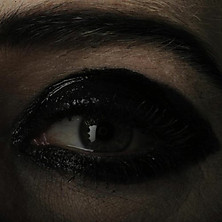“Depressing, lugubrious and down” is how Canadian singer-songwriter Rufus Wainwright speaks of All Days Are Nights: Songs for Lulu. The 48-minute song-cycle, written during the long and painful death of his mother Kate McGarrigle, divided fans. When the pop star toured the piece, alone at his piano, dressed in a 17-foot-long, black feathered cape, many were surprised at his request to remain silent between songs.

 “Thank you for playing along during the first set,” he said to his audience when the tour kicked-off at Toronto’s Elgin Theatre 18 months ago. “You were very Canadian and well-behaved.”
“Thank you for playing along during the first set,” he said to his audience when the tour kicked-off at Toronto’s Elgin Theatre 18 months ago. “You were very Canadian and well-behaved.”
But there’s another side to Wainwright’s music waiting to be explored and Ottawa-born mezzo Wallis Giunta is eager to share it with MusicTORONTO concert-goers fortunate enough to have a ticket for her March 1 recital. “There’s a lot of hope in the songs,” she says. “I actually find the collection to be quite uplifting. . . There’s one song that’s called Sad With What I Have. It’s probably the most outwardly depressed song. But even there, there’s a happy ending. In it he’s saying how his family is falling apart: I’ve lost my mother, my father’s really sick, my sister doesn’t talk to me. Still, it’s about how he’s found his fiancée and is in love with him – and that’s going to be how life is.” In the words of the last line of the song: “Sad with what I have except for you.”
Giunta – now based in New York soaking up what the Met’s much sought-after Lindemann Young Artist Development Program has to offer and already touted by those in the know as a star in the making – comes by her interpretations with Wainwright’s blessing. “The first time I sang a song for him, I did it just like his CD,” she tells me. “I didn’t know what he wanted. After a few bars, he stopped me and said ‘It’s beautiful, but I really want it to sound like what you do.’ So I completely changed my approach and sang it like a regular art song. He wanted no scooping, no sliding, a solid rich vibrato, full tone, the expression I normally give to a song.”

(Miv Photography)
Does she wish to create intimacy of contact with an audience by hugging a microphone on stage and working closely with it, as Wainwright himself does? “Not a bit. The songs are not really written like that, although it may come over that way on the CD. They are so well written. The range is perfect for me. I don’t feel I’m going to have any issues like that. No.”
Is there a meeting ground between Wainwright’s cycle and the Schubert art songs that she sings? “Schubert’s cycles often have a trajectory and story they tell. This is a collection more than a cycle. Taken together, the songs tell a story, but there’s no through line of content. They’re really just 12 songs that he wrote at the time he was dealing with his mother’s death. They’re all extremely different in sound, in tempo and in length and in language. Some of them are Shakespeare sonnets, most are to his own texts.”
Giunta has already made Canadian popular song part of her repertoire with her arrangement, with harp, of Gordon Lightfoot’s tender Affair on Eighth Avenue. She also searched through songbooks by Jonie Mitchell and Rufus Wainwright for more songs that might translate to a solo recital. “Generally Rufus Wainwright’s songs are not structured like the usual pop song in the verse-chorus-verse-chorus thing,” she explains. “They always have more of an art song structure. I always have thought that his songs could be done in the classical concert hall.”
Knowing of her interest in exploring new ground, a vocal coach (coincidentally working on a performance of Wainwright’s Songs for Lulu given by four young singers) gave her a copy of the as yet unpublished score. Giunta was already familiar with the songs from the CD recording. Then, when she found herself sharing the stage with Wainwright at a COC fundraiser in Toronto this past July, she seized the opportunity on the return plane journey to New York to ask his permission to perform the songs at her MusicTORONTO concert. “He said he loved the idea and was excited that the solo recital premiere would be in Canada,” she says. Wainwright also asked for Giunta’s help in preparing the score for publication. “He wanted to make sure that all the markings in the score are what we singers need to get the sound he wants,” says Giunta. “So we’re doing three songs at a time, working together to get all that sorted out. In the meantime I get exactly what I need.”
“I don’t feel that when I’m singing Rufus Wainwright that I’m channeling him or trying to imitate him. I just take these songs that are beautiful and sing them the way I feel them. And that’s what he’s asked for.”
Wallis Giunta
Wallis Giunta (mezzo) with Steven Philcox (piano) – Wainwright, Britten, Bridge, Coward, Barber, Musto, Dove. Thursday March 1, 2012 – 8:00 pm. Jane Mallett Theatre, St. Lawrence Centre for the Arts, 27 Front Street East, Toronto
Posted by Keith Horner


